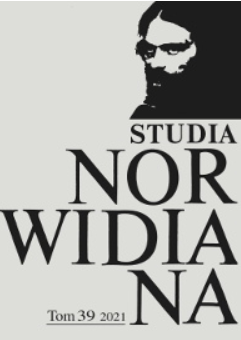Kiedy debiut jest pożegnaniem. Ostatni mój sonet Norwida i Adieux à la poésie Louise Ackermann
When every debut is a farewell . “Ostatni mój sonet” by Norwid and “Adieux à la poésie” by Louise Ackermann
Author(s): Magdalena KowalskaContributor(s): Grzegorz Czemiel (Translator)
Subject(s): Poetry, Comparative Study of Literature, French Literature, Polish Literature, Theory of Literature
Published by: Towarzystwo Naukowe KUL & Katolicki Uniwersytet Lubelski Jana Pawła II
Keywords: Louise Ackermann; Parnassianism; debut; farewell; sonnet; lyre;
Summary/Abstract: This article offers a comparative interpretation of two poems: “Ostatni mój sonet” [My Last Sonnet] by Cyprian Norwid and “Adieux à la poésie” by Louise Ackermann. Although these two authors differ in terms of sex, nationality, artistic style as well as the national and European reception of their work, these two poems are only four years apart. Both prove to be interesting material for study due to their simultaneous “debut” and “late” character: they describe gestures of bidding farewell to poetry in some specific aspect and in general. The lonely existence of the lyrical “I” in Ackermann’s poem and its sombre mood can be juxtaposed with the relation between “I” and “you” and the increasing scale of emotions in the lyric by Norwid, leading to the conclusion that both works elaborate on the theme of human indifference to the feelings of others, and on the misunderstanding of both authors’ poems by their readers. What dominates in the case of Ackermann is the fear of lack of empathy, while Norwid emphasizes the problem of conventions that hinder real communication. What this is proves is that in these “debuts” the two authors bid farewell only to certain properties of poetry characteristic of the period’s lyricism (expression of the feelings of the lyrical subject and the convention of sonnet-like love lyricism), while these two poems themselves open passages to different stages of poetic creation.
Journal: Studia Norwidiana
- Issue Year: 2021
- Issue No: 39
- Page Range: 135-150
- Page Count: 16
- Language: Polish

